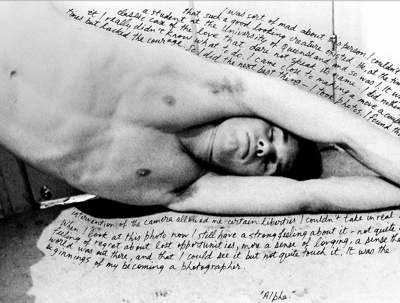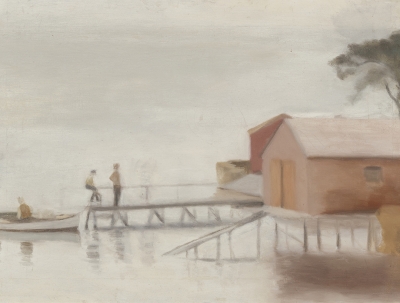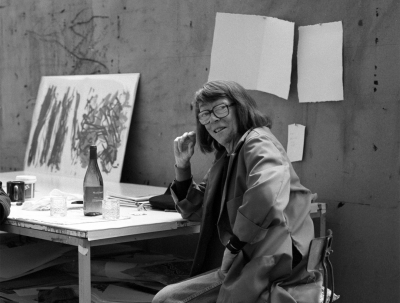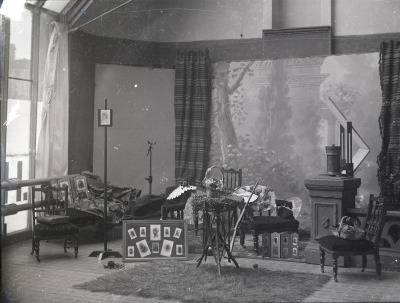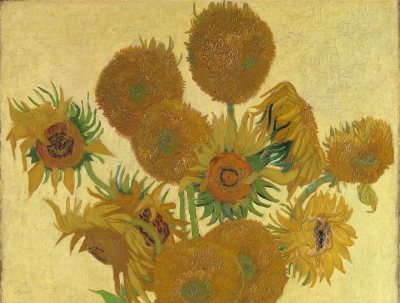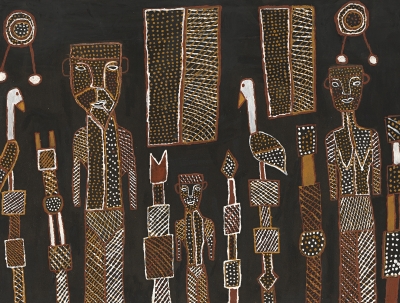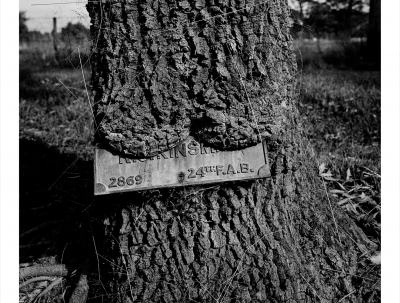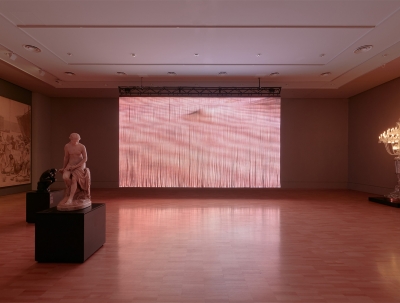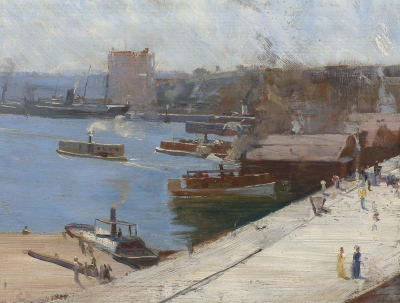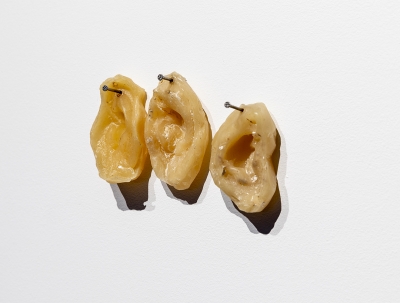Visual Arts
With its title, William Yang: Seeing and Being Seen, an exhibition at the Queensland Art Gallery, signals two prongs of the politics of vision: the power of the gaze and the importance of representation, an apt framing for an artist who has been invested in both for more than fifty years. As a substantial and generous retrospective, curated by Rosie Hayes, it threads together the distinct but connected themes of Yang’s practice: queerness, particularly the queerness of gay men; Chinese-Australian identity and experience; the Australian landscape; and the art, film, and literary scene in Sydney.
... (read more)Clarice Beckett: The Present Moment
Bells and whistles are common enough, in both form and content, in contemporary exhibitions. This time they are actual, sonic: a soundscape of birdsong, a Melbourne tram bell, clopping horses’ hooves floating through Clarice Beckett: The Present Moment, which is at the Art Gallery of South Australia (AGSA) until 16 May. It’s lovely, subtle, complementing a revelatory encounter with an artist whose work is, through Tracey Lock’s enchanting exhibition, about to become far better known.
... (read more)The American Joan Mitchell is one of a legion of celebrated twentieth-century artists with a ghost presence in this country. Since her death in 1992, her vibrant, energetic paintings have become increasingly appreciated, and now her star is rising again. This year Mitchell is the subject of a major retrospective in the United States, which will also be seen in Paris in 2022. The National Gallery of Australia’s current exhibition is part of the year-long Know My Name suite of projects. An outcome of the NGA’s long relationship with master printmaker Kenneth Tyler, Joan Mitchell: World of Colour, led by emerging curator Anja Loughhead, is the first exhibition anywhere to focus solely on Mitchell’s prints, which were made in two concentrated bursts with Tyler, in 1981 and again in 1992, just before the artist’s death.
... (read more)Few exhibitions about photography are premised on something other than the resulting image. The Business of Photography: The 19th century studio in NSW at Sydney University’s new Chau Chak Wing Museum makes an intriguing step back from the cased daguerreotypes, carte de visite, and collectable stereo cards of the nineteenth century. It invites visitors into the places of these images’ latency and the jostling personalities that brought them into being. Curator Jan Brazier has put together a playful show that tracks the photography studio from mid-nineteenth-century itinerant operations to early twentieth-century industrial powerhouses. It highlights the tension between the boosterish egos and financial precarity that shrouded these businesses in colonial New South Wales.
... (read more)It is hard not to marvel at the logistical challenges that must have faced the production of the National Gallery of Australia’s current blockbuster exhibition, Botticelli to Van Gogh: Masterpieces from the National Gallery, London. Amid a global pandemic that has effectively brought international travel to a halt, the NGA has made it possible for Australians to view some of the most important paintings in the history of Western art – paintings only ever seen in London. Without having to board an aeroplane, this exhibition transports the visitor to the National Gallery on Trafalgar Square, which is currently closed. Visitors to Botticelli to Van Gogh are given the precious opportunity to stand – socially distanced, of course – in front of sixty-one works by artists such as Titian, Hals, Velázquez, Turner, and Monet.
... (read more)Today, our screen-filled lives both encourage and condition us – through our collective, incessant scrolling – to dip in and to consume; a modus operandi or malaise that affects both exhibition-making and the viewing habits of audiences that are increasingly enticed and rewarded by contemporary art as spectacle – art that is immersive, often participatory in some way, and that looks great on Instagram. TIWI, the major survey of Tiwi art at NGV Australia, stands in stark contrast to this phenomenon. It invites us to slow down in order to absorb the stories, connections, and extraordinary sense of cultural continuity that reverberates across the exhibition. It is at once a celebration and a joy to experience.
... (read more)Postwar memorial gardens can be found the world over. Gardens scholar Paul Gough has noted how planted memory is an essential aspect of future remembering; gardens create inclusive spaces that rely on participation and careful nurturing to ensure that memory stays ‘alert, relevant and passed on from generation to generation’. The dedicated memory garden at Melbourne’s Shrine of Remembrance is a site of ritual remembering of equal importance to sites such as Anzac Head in Turkey. Gough argues that the front can be symbolically transplanted. Objects, seeds, letters, and small packages of soil were often bought home, particularly where bodily remains could not be retrieved.
... (read more)In Giambattista Battista Tiepolo’s The Banquet of Cleopatra (1743–44) – a jewel in the NGV’s collection of eighteenth-century art – a dining table shows the Egyptian queen Cleopatra facing the Roman consul Mark Antony, her hand elegantly clasping a pearl earring that she is about to drop into a flute glass filled with vinegar, which she will subsequently drink. In doing so, the sheer value of the pearl will make Cleopatra the winner of a wager as to which of the two could stage the most extravagant feast.
... (read more)The purpose of a retrospective exhibition is to reconsider, to come to fresh insights. Streeton, now at the Art Gallery of New South Wales, is the largest exhibition of the painter’s works since his 1931 lifetime retrospective, which was also at AGNSW (the current offering is only twenty works shy of that show’s massive total of 170). It’s a feast, one that enables us to reassess the great man’s art. And like all good retrospectives, it questions older certainties.
... (read more)Looking Glass: Judy Watson and Yhonnie Scarce
Just inside the first large gallery space at the TarraWarra Museum of Art is a wall-size photograph of a cemetery in a palette of muted greys. The graves are homogenous, modest, tilting with age. Scattered among the headstones are sun-bleached plastic flowers and concrete teddy bears clasping empty concrete vases. In front of the photograph stands a mortuary table bearing blackened glass objects.
... (read more)
